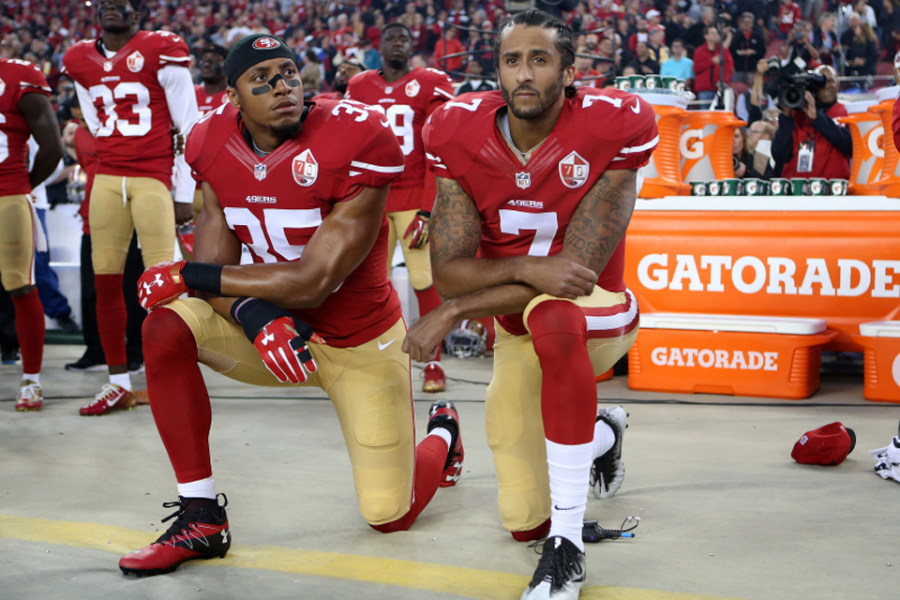Taking a seat, taking a knee, taking a stand
QB’s critics miss point of patriotism
September 29, 2016
San Francisco 49ers quarterback Colin Kaepernick began the movement before a late August preseason game. He refused to stand for the National Anthem as a protest against racial oppression and police brutality in the United States. Several other players began to follow, including 49ers teammate Eric Reid and Jeremy Lane of the Seattle Seahawks. On September 9, Denver Broncos linebacker Brandon Marshall took a knee. On September 11, four Miami Dolphins players took a knee while the entire Seahawks and Kansas Chiefs teams linked arms while multiple other players raised their fists in the air.
The protest ignited an ongoing discussion about the nature of protest and patriotism.
Kaepernick’s explained his goals this way: “I’m seeing things happen to people that don’t have a voice, people that don’t have a platform to talk and have their voices heard, and effect change. So I’m in the position where I can do that, and I’m going to do that for people that can’t.” People have definitely responded to Kaepernick’s protest, but some have not heard his message. Unfortunately, as author Peniel Joseph (CNN) articulated, “Now a black athlete that white Americans have cheered on the football field is being widely demonized for daring to ‘stand’ with the people that are being oppressed.”
From August 16 to September 16 a poll given by Reuters asked respondents the “extent to which [they] agree or disagree with the statement, ‘I support the stance Colin Kaepernick is taking and his decision not to stand during the national anthem.’” The poll included 2,093 people with a variety of racial backgrounds, and 72 percent consistently disagreed and named his behavior “unpatriotic.”
These critics argue through their values of respect towards the flag and its connection to American soldiers who fought and died in order to defend our freedom.
Kaepernick answered that criticism directly, stating, “I have great respect for men and women that have fought for this country. I have family, I have friends that have gone and fought for this country. They fight for freedom. They fight for the people, they fight for liberty and justice for everyone. And that’s not happening. People are dying in vain [at home] because this country isn’t holding their end of the bargain up.”
Critics also argue with that Kaepernick’s wealth somehow cheapen his protest. He cannot, the logic goes, claim to fight oppression because he’s “enjoying [his] $114 million contract, [his] previous adoring fans, sucking up a life of luxury” as Sarah Palin put it. Regardless of his wealth (which he worked immensely hard for), Kaepernick clarifies that his protest “wasn’t for me. This stand wasn’t because I feel like I’m being put down in any kind of way. At this point, I’ve been blessed to be able to get this far and have the privilege of being in the NFL and making the kind of money I make and enjoy luxuries. But I can’t look in the mirror and see other people dying in the street that should have the same opportunities that I’ve had and say, you know what, I can live with myself.”
In fact, Kaepernick also summarized his experience of mistreatment by cops while helping his roommates move out of a house in college. “We were the only black people in that neighborhood, the cops got called and all of us had guns drawn on us. I mean, [the cops] came in the house without knocking, guns drawn, on one of my teammates and roommates.”
For me, the most convincing reason to support Kaepernick is the way veterans, the very people supposedly injured by his actions, are rallying to support him. For example, military veterans spoke out, advocating for Kaepernick’s right to protest, starting the trending hashtag #VeteransforKaepernick. The Blaze host Tomi Lahren was confronted by Veteran David Kepford Meryhew, who opposed her arrogant and offensive rant. Meryhew expressed how he joined the military “to protect the rights [Kaepernick] acted under.” Also recognizing Lahren’s attitude for someone who claims to support freedom of speech, Meryhew called her “an immature school girl [because she doesn’t] agree with how someone expresses themselves. [Kaepernick] sat in a peaceful protest because he felt motivated to exercise his first amendment right in response to a grievous social issue.” Colin Kaepernick should be celebrated for exercising his constitutional rights through a peaceful protest, not loathed.
President Barack Obama was not as explicitly supportive but acknowledges he would “rather have young people who are engaged in the argument and trying to think through how they can be part of our democratic process than people who are sitting on the sidelines not paying attention at all.” Despite Kaepernick’s “step further” to donate $1 million to organizations relieving communities impacted by racial injustice and police brutality, Obama also articulates that he “generated more conversation around some topics that need to be talked about.” And racial inequality needs to be discussed. Those who claim we’re in a “post-racial” United States, proven by the existence of our first black president, casually ignore the difficulty of stripping away oppressive policies developed throughout a history of 43 presidents and hundreds of years of slavery before that. Eight years of a black presidency are symbolic, but they are not a sufficient amount of time to initiate monumental change in racial injustice.
Kaepernick’s critics are wrong. All citizens should be able to proudly stand during the National Anthem, displaying real pride. When a citizen cannot feel that pride because of a real social issue, they should be able to exercise their dissatisfaction. That is the very substance of American freedom: adding one’s voice to the discussion. The United States is not perfect, and minorities do suffer mistreatment in the hands of the white majority. At least Colin Kaepernick is sparking conversation.
Now, the success of his protest, and my hope for the future, rests on whether or not legislators or communities will create real change. Allowing history to unfold will ultimately judge whether Kaepernick’s actions are positively consequential, just as Rosa Parks sitting down to stand up for our rights.








